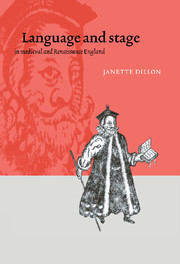2 - Staging truth
Published online by Cambridge University Press: 15 January 2010
Summary
Medieval dramatic tradition used to be conceived within a linear model. Scholars thought in terms of origins and evolution, of a learned, Latin liturgical drama staged inside the church slowly developing into a popular, vernacular religious drama staged in the open air. More recent work has shown that the two kinds of drama and the two modes of staging existed side by side, and intruded into one another's space. There is evidence from as early as the twelfth century of Latin liturgical plays within the church coexisting with both Latin and vernacular plays outside it (Tydeman, The Theatre in the Middle Ages, p. 124), and the evidence may well postdate actual conditions. Latin and vernacular plays are not two ends of a spectrum but two sides of a coin, two practices in dialogue with each other, each defined against the known and felt existence of the other. It is not uncommon for either mode to make space for explicit reference to the other, so that its own discourse is perceived against that other possible discourse. Latin playtexts may introduce vernacular speech, while vernacular plays often incorporate sung or spoken Latin. Many plays, such as the N-Town Mary Play, the Anglo Norman Jeu d'Adam or the Shrewsbury Fragments, are more truly macaronic than Latin or vernacular. In fact, the evidence of playtexts suggests that a binary division between ‘two kinds of drama’ is inappropriate.
- Type
- Chapter
- Information
- Language and Stage in Medieval and Renaissance England , pp. 31 - 50Publisher: Cambridge University PressPrint publication year: 1998



